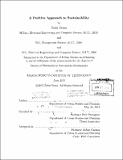A positive approach to sustainability
Author(s)
Dossa, Zahir (Zahir A.)
DownloadFull printable version (18.26Mb)
Other Contributors
Massachusetts Institute of Technology. Department of Urban Studies and Planning.
Advisor
Phil Thompson.
Terms of use
Metadata
Show full item recordAbstract
Sustainability is a complex term that is becoming increasingly used. While extremely important, sustainability is often misused and misunderstood, yielding undesirable effects. Furthermore, many organizations promote the image of being sustainable without embracing it, otherwise known as green-washing, yet those that truly are sustainable face difficulty communicating their sustainability practices and distinguishing themselves as such. Despite its complexity, sustainability remains an important term that necessitates a greater conceptualization. In this dissertation, three topics in sustainability (sustainability performance, sustainability innovation, and sustainable development) are explored through a positive approach. A positive approach, also referred to as an abundance approach, is one that espouses a greater understanding for how the highest ideals and fullest potential can be achieved as opposed to one that focuses on fixing immediate problems. Borrowing from positive organizational scholarship (POS) theory and the positive organizational ethics (POE) literature, a framework for capturing sustainability performance is developed in Chapter 2 that shifts the emphasis from minimizing negative externalities to maximizing positive outcomes. Extending upon POS theory, the crisis-PEN-innovation framework advanced in Chapter 3 aligns various literature on innovation to postulate that sustainability innovations are achieved through the formation of positive ethical networks (PENs) that arise in response to external crises. Finally in Chapter 4, a PEN analysis is conducted to foster a greater understanding of project trajectories and outcomes in the sustainable development field. It is therefore through the lenses provided by the POS and POE literatures that new frameworks for conceptualizing topics in sustainability can be developed.
Description
Thesis (Ph. D. in Sustainable Development)--Massachusetts Institute of Technology, Dept. of Urban Studies and Planning, 2013. Cataloged from PDF version of thesis. Includes bibliographical references.
Date issued
2013Department
Massachusetts Institute of Technology. Department of Urban Studies and PlanningPublisher
Massachusetts Institute of Technology
Keywords
Urban Studies and Planning.
